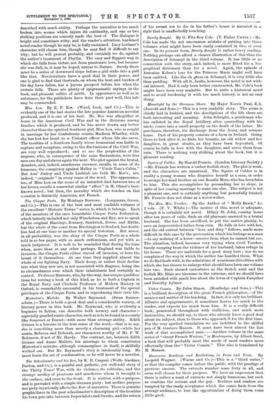Misterton's Mistake. By Walter Raymond. (Swan Sonnen- schein.)---There is both
a good deal and a considerable variety, of literary power in this book. Mr. Raymond, who is evidently a beginner in fiction, can describe both scenery and character— especially gnarled rustic character, such as is to be found in a county like Somerset or Dorset—with more than average ability. Edith Grimes is a heroine in the true sense of the word,—that is to say, she is something more than merely a charming girl—while her aunts, Rebecca and Deborah, are characters worthy of Mr. F. W. Robinson, if not of Mr. Hardy. The contrast, too, between Edith Grimes and Annie Mullett, his marriage to whom constitutes Misterton's mistake, although commonplace in itself, is skilfully worked out. But Mr. Raymond's story is intolerably long. He must learn the art of condensation, or he will never be a novelist.
The Sch9olmaster and his Son, by K. H. Caspari (Wells Gardner, Darton, and Co.), is a painful and pathetic, yet well-told story of the Thirty Years' War, with its violence, its robberies, and the strange medley of picaroons and murderers whom it brought to the surface, and even to the front. It is written with a purpose, and is pervaded with a simple German piety; but neither purpose nor piety injuriously affects the flow of narrative. There is genuine graphic force in the poor schoolmaster's description of the troubles his town gets into between Imperialists and Swedes, and the return
of his errant son to die in his father's house is narrated in a style that is unaffectedly touching.


















































 Previous page
Previous page